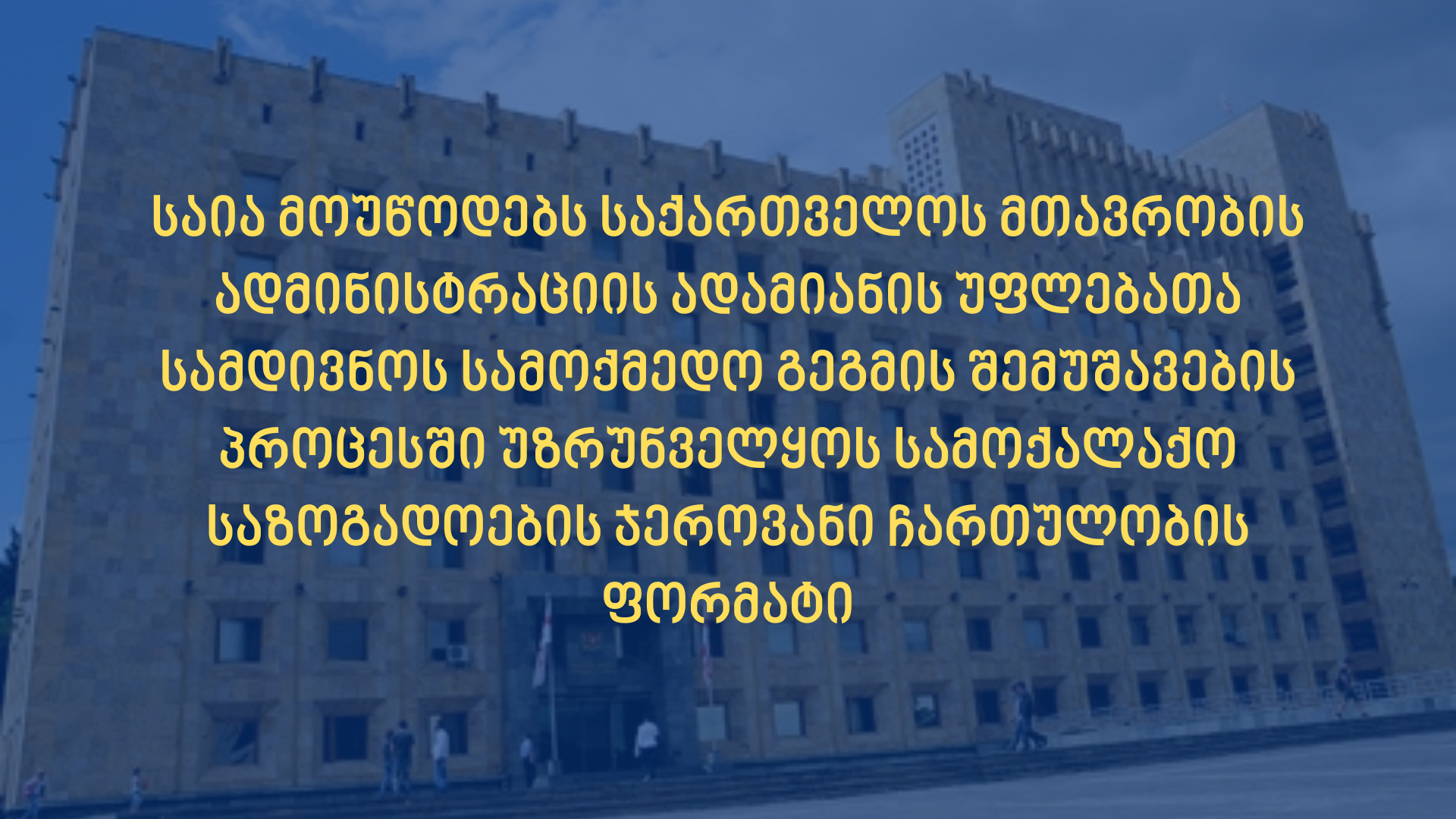


On June 6, at the initiative and facilitation of the Public Defender of Georgia, a meeting was held with Prime Minister's adviser on human rights Niko Tatulashvili and civil society representatives. The meeting aimed to discuss the issues related to the development of the action plan of the national human rights strategy between the government administration and civil society representatives, mainly in the direction of the need to ensure the continuous involvement of civil society organizations.
At the meeting, representatives of civil society organizations voiced the key concerns related to the deterioration of the legal situation in the country, including the practices of narrowing the space for civil society.
It should be noted that since February 2023, #GYLA, with the support of the European Union (EU) and the United Nations Development Program (UNDP) project "Human Rights for All", is actively coordinating the process of submission of opinions by civil society organizations for the development of an action plan.
In relation to the action plan for the protection of human rights, non-governmental organizations still in February 2023 declared their readiness to submit written opinions in a coordinated manner to the Human Rights Secretariat of the Government of Georgia, however, the bill initiated by the members of the parliamentary majority on "transparency of foreign influence" made it impossible to take into account the strategy and the action plan or Effective performance of a task/activity.
Because of this, on February 28, 2023, more than 50 civil society organizations sent a letter to the Secretariat confirming their desire to prepare written comments on the Human Rights Action Plan and present them in a coordinated format. However, the same letter emphasized that due to the initiation of bills on transparency of foreign influence, given the existing Russian experience of increasing control, harassment and repression, it was impossible for these two processes to coexist in parallel. In addition, the signatory organizations called on N. Tatulashvili to publicly state his position regarding the draft law, and to meet with the organizations in a private format. The civil society organizations did not receive any feedback from the Secretariat on the mentioned letter.
On March 19, 2023, civil society organizations sent the 2nd letter to the Secretariat. In the letter, they expressed their position that despite the drafting of laws, the use of derogatory and hateful language towards human rights defenders and any attempt to narrow the space for civil society (in the form of the mentioned laws or other legislative or practical manifestations) will be against the fundamental values of the European Union, will sabotage the process candidacy status and voilate Article 78 of the Constitution.
In the same letter, it was emphasized that in the process of developing the human rights action plan, it is critically important for civil society organizations to represent the voices of people whose interests they have been protecting for years through various legal means or service delivery. Especially considering that some rights groups are not mentioned in the strategy at all. For civil society to be fully engaged, it is important that there is a real, tangible possibility that decision-makers will take the proposals into account. Otherwise, the involvement of civil society will have a fictitious character and it cannot provide the legitimate goals that the existence of inclusive processes in a democratic society serves. In this regard, the secretariat was asked to inform in writing: 1. In what time frame is it planned to develop the human rights action plan? 2. Has the Secretariat developed a formal rule that defines the organization and timeline for the development of the action plan? When are the stakeholder meetings scheduled? 3. With the participation of which interested parties is it planned to develop the action plan? Is the involvement of civil society considered in the process of developing the action plan? If the answer to this question is positive, what is the format of involvement of civil society organizations? The mentioned information was/is important for the effective planning of the activities of civil society organizations in relation to the action plan, including from the point of view of presenting opinions. There was no feedback from the secretariat on this letter either.
Thus, it should be noted that civil society organizations at all stages expressed/express their willingness to contribute to the process of developing the action plan, however, the said involvement should be a process accompanied by a relationship based on trust, otherwise, along with hostile processes towards civil society, any involvement is fictitious, illusory.
ჯ. კახიძის #15, თბილისი, საქართველო, 0102 ; ტელ: (995 32) 95 23 53; ფაქსი: (995 32) 92 32 11; ელ-ფოსტა: gyla@gyla.ge; www.gyla.ge
15, J. Kakhidze str. 0102, Tbilisi, Georgia. Tel: (995 32) 95 23 53; Fax: (995 32) 92 32 11; E-mail: gyla@gyla.ge; www.gyla.ge